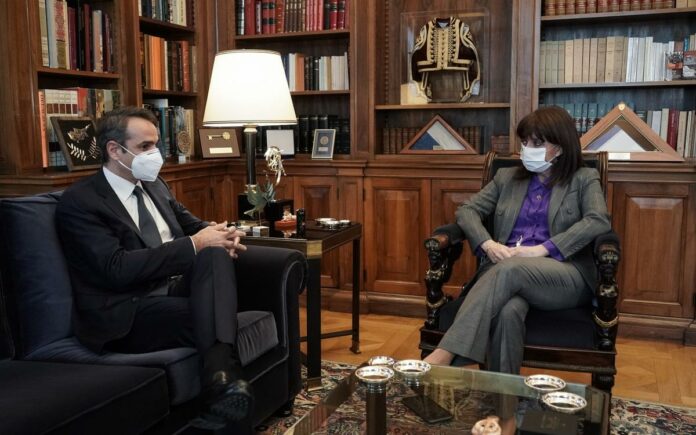Greek Prime Minister Kyriakos Mitsotakis on Friday touched directly on two abrupt furors dominating the national limelight this week, both of which continue to offer plentiful fodder to the political opposition to attack his government, namely, poor handling of repercussions from a snow storm that hit the greater Athens area and “MeToo” allegations that have evolved into charges of a pedophile ring and even a cover-up.
Mitsotakis used a meeting at the presidential mansion in Athens with Greek President Katerina Sakellaropoulou, the ceremonial head of state, to comment directly on the sharp criticism faced by his government, with both matters now also heavily dominating social media platforms in Greece, even as the country still remains in a partial to full pandemic lockdown.
Commenting on the extensive power outages in northern Athens and other parts of Attica prefecture from the storm, which was even given a name, “Medea”, Mitsotakis acknowledged the anger over delays in restoring power and water supply.
Many of northern Athens’ leafier and upscale districts, especially those at higher altitudes surrounding Mt. Penteli, Mt. Dionysus and along the main north-south highway, experienced days of power outages, typically due to felled trees snapping power lines.
“It’s clear … that there’s a bothersome overlapping of responsibility by various state entities. I was personally committed, even before the latest inclement weather, that this issue must be resolved by a framework law, where everyone knows where his responsibility begins and ends, so that there’s a corresponding liability.”
In terms of the other, and much more explosive furor, Mitsotakis said the sexual assault of minors is an even more heinous version of the campaign to reveal and denounce past and current sexual blackmail and abuse.
“Phenomena of abuse of power, primarily against women, but not exclusively, I believe have shocked us all…some people broke the silence with their voice. The time has come for us, with our action, to give continuity to these charges, so that we can balance between the rule of law, on the one hand, and a just society, on the other,” Mitsotakis told Sakellaropoulou, with cameras rolling.
The director of Greece’s prestigious National Theatre resigned earlier this month amid a barrage of accusations of improper relations and even felony abuse leveled by an undetermined number young men, when they were teenagers. The most high-profile accusation by one man, in a televised interview, dates back 25 years ago when he was a budding actor.
The controversy swirling around the now former head of the state-run national theater, himself a noted actor and director, have morphed into a political furor, with the opposition now demanding the resignation of Culture Minister Lina Mendoni for allegedly covering up the affair, or for not knowing about past abuse. Others opposition politicians claimed the man’s alleged past behavior was known, something that was disregarded when he was appointed by the Mitsotakis government at the helm of the country’s top theater company.
Other allegations – of sexual blackmail, improper behavior but also extreme bullying – had earlier been leveled at a handful of commercially successful actors and directors.
The entire Greek “version” of the “MeToo” campaign erupted last month with a shocking allegation by Olympic gold medal sailing champion Sofia Bekatorou, who charged that she was sexually abused 22 years ago by a top sailing federation official.
While the allegations have generated a firestorm of debate on social media and heightened media attention, the situation is still completely murky in terms of which high-profile claims have been accompanied by testimony to authorities, such as police and magistrates, or with the filing of lawsuits in civil courts, or even if some of the alleged incidents are within statutes of limitations.














